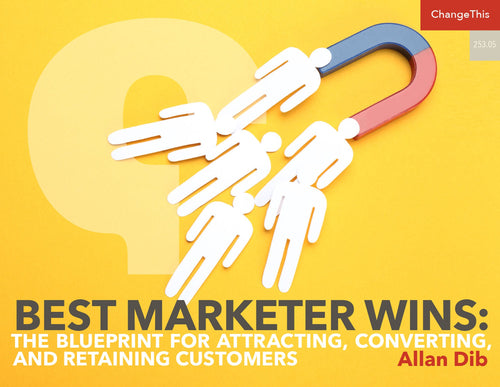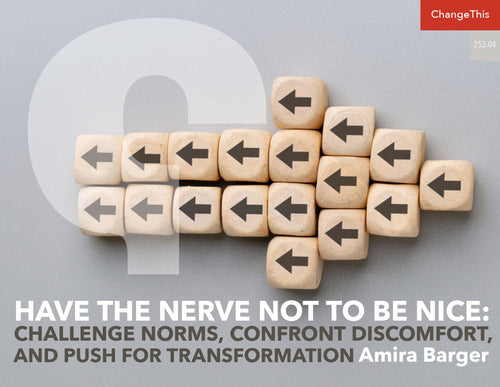Bringing Passion and Evangelism Together in Your Business: The Unquenchable Spirit of Co-Creation
"Co-creation means banding together with another organization or person to build something together that you could not have built alone. To do this right, you must intertwine your futures together in a highly significant manner."
Do you co-create value with others? Do you understand—deep in your gut— that you cannot succeed in the future by going at it alone?
Co-creation means banding together with another organization or person to build something together that you could not have built alone. To do this right, you must intertwine your futures together in a highly significant manner.
Taking a step like that requires the heartfelt belief that the two of you are much better off together than you were on your own. This belief must survive obstacles, setbacks, delays, disappointment, and even (gasp) looming failure.
Which leads me to the utter importance of passion and evangelism.
Evangelism is the sum of passion and conviction rooted in deeply held beliefs, which compel the evangelist to influence others. For reasons obvious and less so, there are sustainable competitive advantages in having an ecosystem of enterprise evangelists internal and external to your organization.
You are probably most familiar with the term “evangelism” in its religious context, but the term can also mean missionary zeal applied outside the framework of religion. At its root, evangelism is about a desire and intent to persuade others, to influence them, to summon them to take action… because the evangelist believes wholeheartedly in whatever it is that inspires him or her. This is the aspect of evangelism you want to leverage on your organization’s behalf.
Evangelism is driven by passion—an earnest, authentic, compelling emotion that says, “I’m wild about this and I want you to be too.” Constructive passion is credible. Positive passion is infectious. Impactful passion is persuasive. Don’t be afraid of passion; don’t write it off as “zeal” of the kind that springs from closed minds and leads to confrontation instead of collaboration. Yes, people can be unsettled by passion: they will say things like “this person is a zealot” or “he’s a hothead.” But not necessarily… many are simply passionate about what they’re doing. Rather than fearing evangelical passion, learn to put it to work to drive your organization’s evolution.
Evangelism in the context of a Co-Create business model allows you to focus on fewer customers and make them more successful, to have more impact on their lives, and to create passionate advocates who do your selling for you. Evangelism can connect you with employees you would never have found through a recruiter; investors who would never have taken a second look at your prospectus; media coverage you could never have won on your own.
Evangelism is the net return on impact. Evangelism is the tangible reward for being amazing at identifying needs and delivering value to key stakeholders.
Passion, on the other hand, is a bit less “in your face.” It is what motivates us to learn, recover after a mistake, find inspiration, and apply it in ways that cross-pollinate and spark innovation. When you see a good idea at the grocery store and you think, “How could we apply that at our business?” That’s a sign of passion. For example, people are absolutely passionate about craft beer these days, and small breweries are proliferating all over the country. Traveling in the northeast recently, I walked into a chain supermarket and saw something very appealing and smart. While my Atlanta store has a local beer section where six-packs are all gathered in the case, here there were shelves selling individual bottles of twenty-five local brews, with a handy rack holding the slotted carrying cases in a clever design. You had to buy a six-pack for a fixed price, but it could be six different beers, eliminating the fear of buying a whole six-pack of something you end up hating. The business takeaway: Maybe maybe there’s a way to switch up your offerings to appeal to more clients, or uncover unusual but valuable partnership opportunities.
Where Does Passion Come From?
The word “passion” derives from the Latin root pati, meaning “to suffer,” which highlights the fact that passion moves people to persevere, to push through pain or difficulty. Recent studies on concert pianists in Stockholm have built upon work with long-distance runners in the United States demonstrating that there are measurable physiological responses in parts of the brain during motivated activity (the ventral striatum and amygdala). Yes, there is solid neuroscience behind that “flow state” you enter when you are passionately engaged in something you find meaningful. And what’s more, the greatest increases in blood flow and activity in the brain seem to be in areas connected with creativity.
I wake up every morning feeling blessed that I am able to do something I’m passionate about. When I travel as a speaker and consultant and I am in the fifth city in a week, it’s not energy drinks that keep me going—it’s passion. When an entrepreneur is told “no” by one hundred potential investors, and the 101st investor says, “Yes, I believe in you enough to back this,” that perseverance was the result of passion.
When I watched former San Francisco 49ers Hall of Fame wide receiver Jerry Rice on ESPN talking about how he learned his incredible work ethic from his bricklayer dad, I saw his passion for the game of football. I am not certain that every individual has the same spark of passion inside.
But since we all have a ventral striatum and an amygdala, I want to believe we all have the potential to feel it—if we can just find whatever it is that that lights up our hearts and minds.
Successful brands tap into that passion. Ducati comes to mind for its attention to performance with style, and Apple for its intense commitment to product aesthetics. Before you conclude that passion is only for B2C, consider the Silicon Graphics, Inc. (SGI) subsidiary Alias|Wavefront. I worked for them in the mid mid-1990s. Alias had a truly world-class animation and 3D-modeling software product that industrial designers loved. People became such evangelists of Alias|Wavefront, that if they left one firm, the first thing they would do in their next was to ask for Alias|Wavefront software and SGI hardware. As a result, SGI invested little in trying to gain mindshare from industrial design firms; the industry workforce was an active army for its products. Products that create evangelists are a marketing hack that can elevate a brand far above competitors. All you have to do is make a product so phenomenally great that its users can’t imagine life—or work—without it.
Leading Passionate Evangelists: Three Insights
Passion is something deep and primal, and leading those who are passionate can be challenging. Passionate people have more zest, drive, and energy… but that can also mean that they make snap judgments, or have blind spots.
To successfully lead such people, focus on three elements:
- Direction
- Specificity
- Outcome focus
Passion needs direction. You need to make sure your advocates understand what they’re evangelizing, and make sure they’re promoting the right attributes. The headmaster of our children’s school told a group of parents, “If you are going to recommend us to others, please recommend us in the right way.” I was curious, so I asked him what he meant. He replied, “No school is perfect. Absolutely, highlight the things you are excited about. But rather than avoiding mention of our flaws, talk about areas where we can improve, and be sure to include what we’re doing about them.” By directing those who are fueled by passion, you create effective evangelists.
Passion needs specificity, because specificity drives credibility. I’m passionate about Ritz- Carlton properties and have experienced a level of service from that brand that makes me want to share my story—not just with a statement like, “I recommend the Ritz,” but with specific, detailed anecdotes, which I tell to fellow travelers often. Arm your evangelists with the right ammunition to intelligently tell your story—specific examples that highlight your successes and demonstrate your integrity by being frank about your growing edges as well.
Passion needs to be outcome focused. Evangelism needs to be transmitted in terms of the outcome for the recipient, not a feature or benefit of the product. If I say, “my new iPhone has a stabilization camera,” I’m being specific. But am I moving you to want one? Probably not. But if I showed you crystal-clear low-light images and a video of my daughter’s soccer goal? Now that’s more believable. My passion is more persuasive, because I’ve helped you see how something I’m evangelizing can help you achieve outcomes you seek.
For evangelism to have the desired effect, the source must be respected and trusted. Recipients of that evangelism must form an opinion that the source is someone who is knowledgeable and credible, and who brings a broad base of experiences that gives their evangelism context. An industrial designer talking about how Alias|Wavefront’s animation makes designing speedboats easier means much more to me than a sales rep’s praise for that feature. How many other design tools has he tried?
Evangelists need to be able to defend their position, not just regurgitate it. If I ask you for specifics and you have no answer, your evangelism just went out the window.
For an example of how this kind of credible, relevant evangelism factors into a business model, consider Airbnb. In a TED talk about the origins of Airbnb, founding partner Joe Gebbia recalled the hurdle that establishing trust between individuals presented to his innovative idea for app-enabled home sharing. As a design student, he knew that “design is much more than the look and feel of something—it’s the whole experience.” He posed the question you will face as you activate your army of evangelists—how do you design for trust in the experience between that army and the recipients of their evangelism?
For Airbnb, a well-designed reputation system was the key: once users (hosts and guests) accumulated ten reviews, acceptance rates for bookings increased. A joint research project with Stanford revealed that the right amount of disclosure—not too much (creepy!) or too little (“Yo!”) is crucial to building trust in a system that relies on reputation created by accumulated reviews.
How did Airbnb operationalize this insight, designing its interface for just the right amount of disclosure? Gebbia said, “We use the size of the box to suggest the right length, and we guide them with prompts to encourage sharing.” This is an example of directing evangelism through software design. It is also an example of team passion on display, as design students and Stanford researchers worked together to discover the best possible solution.
By directing evangelism to be specific and outcome focused, you recognize each evangelist’s ole in the co-creation of that message. You invite them to talk about what matters to them— with great specificity—but to couch it in terms of outcomes for other recipients of that value. This invites the recipient of the evangelism to co-create new value, through engaging with your brand, your organization, your mission. Leaders should recognize the diversity of thought on their teams. Individuals may be equally passionate about the team’s common mission, vision, or enemy, but for different reasons—and that’s okay.
Leaders who make passion and evangelism contagious will always reap its competitive advantages.
Before I go, let me leave you with a few basic observations.
Today, even the simplest business solutions are made possible by the complexity that underlies them. The simpler something looks on the outside, the more complicated it is on the inside… although that complexity may live on the cloud or elsewhere, away from the end user.
To manage complexity, you need a diverse range of skills and knowledge. Translation: you need others. Even the largest companies on the planet can’t succeed on their own.
Some try to address this need through a series of superficial collaborations and partnerships. But these insubstantial relationships will never spark the sort of passion and evangelical zeal we’ve been contemplating.
To maximize your future results, you need to co-create your future in a highly meaningful and momentous manner. You must band together with others in a way that truly matters to all involved.
It must matter enough that it becomes a driving force in your existence. Nothing less will achieve the results you crave. Nothing.
About the Author
David Nour has been a recognized strategist and thought leader on the topic of business relationships for more than 25 years. His insight has been featured in The Wall Street Journal, The New York Times, Fast Company, and Mashable. He is the author of several other books, including the bestselling Relationship Economics.












































